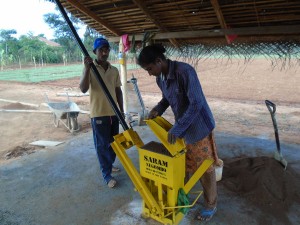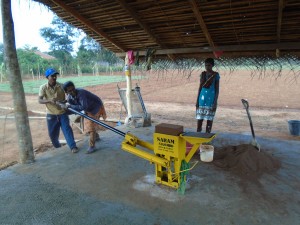UN-Habitat Promotes Eco-Friendly, Compressed Stabilised Earth Blocks for Construction

Devi Earth Block Production Centre in Kilinochchi.
February 2015, Colombo, Sri Lanka. UN-Habitat, promoting environmentally friendly construction practices through its post-conflict recovery programme, has loaned two block making machines for women’s community groups to manufacture Compressed Stabilised Earth Blocks (CSEB) in Sri Lanka’s Northern Province.
This activity will support environmentally friendly and cost-effective housing and infrastructure construction in the conflict affected districts in the North. The CSEB machines have been handed over to two women’s community groups (VRC) in Kilinochchi and Mullaitivu districts.
The compressed stabilised earth blocks are manufactured according to Sri Lankan technical specifications with guidance and supervision from UN-Habitat Technical Officers and Engineers who were trained in the National Engineering Research and Development Centre (NERD) in Ekala.
The blocks will be purchased by homeowners who are constructing their houses in the Northern Province under UN-Habitat’s post conflict recovery programmes.
In order to encourage the use of CSEB as well as other eco-friendly and cost effective building materials, UN-Habitat is also supporting the construction of several “demonstration” houses in the Northern Province. Three houses have already been constructed in Killinochchi, Mannar and Mullaitivu districts over the past two years, with funding from several funding partners.

CSEB production in progress.
Following the successful construction of these demonstration houses, three more houses are currently under construction in Mullaitivu and Killinochchi districts, using CSEBs manufactured by the selected women’s groups. In comparison to sand-cement blocks, the use of CSEBs provides many advantages to homeowners and builders beyond environmental benefits. CSEB walls need no plaster and consume less cement and sand and require less labour than walls constructed of typical sand-cement blocks, thereby being more economical. It is estimated that homeowners can save approx. LKR 35,000 per 550 square foot house by replacing sand-cement blocks with CSEBs. CSEBs offer greater thermal comfort and also provide homeowners more opportunities to recycle and reduce waste. As CSEBs have reduced embodied energy levels and greenhouse gas emissions in comparison to industrial processes, they have less impact on the environment.
This environmentally friendly initiative, implemented by UN-Habitat, is funded by the Government of India, European Union, Government of Australia and the Swiss Agency for Development and Cooperation.
